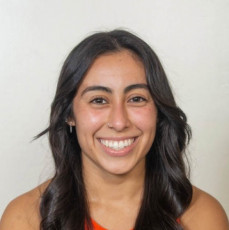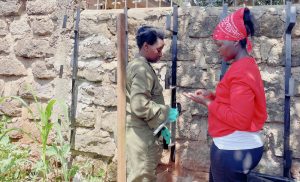As I noted in an earlier blog, Emma is new to the composting program and her garden was not yet finished when we first visited her. Stella then worked with a local welder who was able to create a 3-tier shelf that would hang from a cement wall. The shelves originally came from the garden of Vena, another team member. Vena had to give them away because her landlord would not let her keep them.
When we visited Emma’s yard again she was hard at work with the welder, and we all spent most of the day putting up Emma’s garden. The man nailed planks of wood together in a way that would keep the plastic tarp and soil in place. This way, the wood and plastic formed a long planter box along the cement wall.
Before the seedlings were planted, Stella bought some horse manure which was mixed with the soil and put in the planter boxes. The manure provided moisture and Stella added a layer of hay which served as mulch and kept the soil moist. When we were finished, the wall was not only appealing to the eye but allowed Emma to plant spinach, onions and strawberries from Eunice’s garden along three shelves.
Before mixing the soil and manure, we took a pitch fork and poked holes in the soil. These air pockets allowed the manure to better penetrate and moisten the soil.
Stella is hopeful that with the addition of manure and mulch, Emma can increase production in her garden. Emma will then add water and Lishe-Grow from her compost bins to ensure that the soil remains rich and moist.
Strange as it may seem after some of the worst floods in Nairobi’s history, water is scarce and expensive in the settlements. But as Emma’s experience shows, it is also absolutely essential for the success of many gardens. As a result, gardeners receive an extra $2 a month from the project to purchase water. Stella feels this is money well spent and after a tiring day with Emma I have to agree!
Posted By The Raven McGurll
Posted Jul 6th, 2024




1 Comment
Mary Ellen Cain
July 8, 2024
This is such an encouraging blog after reading of the disheartening gardeners’ concerns described in your previous blogs! I love the sharing of resources among the women such as Emma using Vena’s unfortunately-discarded shelves and the extra plants from Eunice’s garden. Also, how they are learning smart gardening techniques like using manure and Lishe-Grow. And thanks for highlighting the water scarcity issue. It’s good to hear that the project is supporting the gardeners in keeping the plants sufficiently watered.